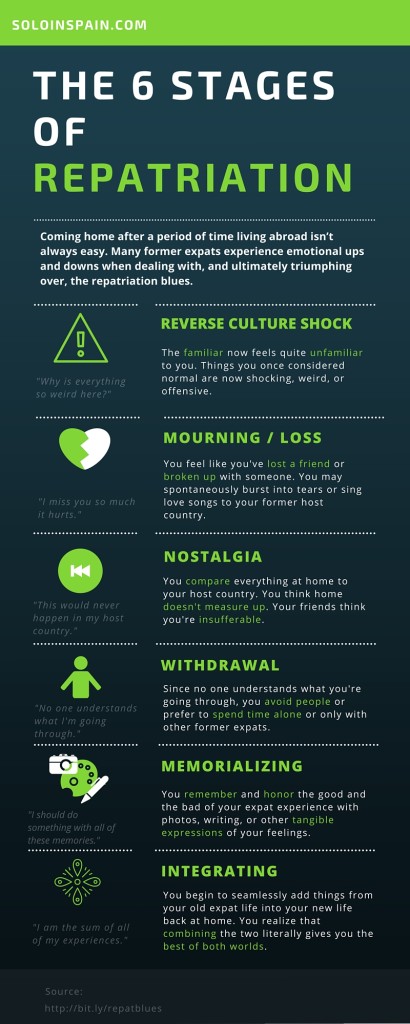Coming home after a period of time living abroad isn’t always easy. Things aren’t the same as you remember. You aren’t even the same. Finding your place again when everyone and everything has moved on can make readjusting to your new old life seem a little bit like learning to walk again. Plus there’s the emotional toll of leaving behind new friends and abandoning what had become your new normal.
To make matters worse, unlike many other major life transitions, repatriation doesn’t always come with its fair share of support and understanding. The opportunity to live in a foreign country is often seen as just that – an opportunity. Something that you’re lucky or blessed to be able to do. On one hand, that’s true, but like any other self-initiated, out-of-the-norm endeavor (e.g., going back to school, changing careers, becoming a parent) it’s also a matter of sacrifice, risk and day-to-day struggle.
Yet, to friends and family back home (and thanks in part to that steady stream of stunning photos in exotic locales on your Facebook and Instagram feeds) you’ve been living on vacay for the past few months or years. And since ‘coming back from vacation’ isn’t exactly a struggle, you may be left to navigate re-entry back to ‘the real world’ on your own.
I’ve been through the repatriation process twice now – actually, you could say that I’m still going through it – and while I don’t claim to have the science of it all figured out, I felt compelled to share my own process of dealing with and ultimately triumphing over the repatriation blues.
6 Stages of Repatriation
Reverse Culture Shock
From the moment you step off the plane, everything about your home country seems familiar, but in an eerily unfamiliar way. It’s like you’re in The Truman Show or The Matrix. You recognize it all, yet it all seems just… a little… off. Things that you once took for granted as completely normal are now shocking, weird, amusing or maybe even offensive to you.
In my first two weeks back in the US, I had the following moments of reverse culture shock:
At the airport, waiting on my bags:
Why is everyone so fat and poorly dressed?
When greeting old and new friends:
Must remember to shake hands, NOT double-cheek kiss. I almost made out with that guy just now.
Shopping for groceries:
Gawd, it’s expensive here. I mean, $8 for a bottle of wine… and it’s not even good!?
Catching up on TV shows:
Seriously? Is EVERY commercial on TV for a prescription drug?
Getting behind the wheel for the first few times:
Wow. Atlanta drivers exhibit a LOT of aggression.
At any given moment on any given day:
This feels suspiciously comfortable. What is all this knowing where I’m going and understanding what everyone around me is talking about?
Even though seeing an old place through new eyes may initially be disorienting, eventually your vision adjusts and things begin to appear a bit more normal. It may take a while, but it will happen.
Mourning / Loss
Once the excitement of being home and the disorientation of reverse culture shock start to fade, a new feeling may settle in. It may come on as just a bit of a funk or it may swell into full-blown depression. For me, this stage was much like the aftermath of an amicable breakup.
At the start, it was all too raw and tender. I’d be prone to spontaneous outbursts of tears, complete with shaking my fists at the heavens wailing, “WHYYYYYYYYY!!!?? Why can’t we be together anymore? Why did I have to leave you so soon? We were just getting to know each other! Will I ever see you again?”
Even after the initial pain had dulled and I found myself only thinking of my long lost other home maybe once a day – I couldn’t bear to look at pictures of the place. The images brought back too many emotions, too much of that feeling of loss. I couldn’t stand to hear anyone else speak about my host country or talk about what they knew of my once-beloved. When others told of their trysts with my ex – whether good or bad – I’d invariably think to myself, “But you don’t know it like I do. You can’t possibly. It was mine! All mine!”
Melodramatic? Yes. But true nonetheless. The feeling of grief that I experienced on returning the US, I found out, was common for many returning expats. Expats interviewed by the Wall Street Journal described their own feelings of loss as: “a punch in the gut,” and, “like having somebody dying.” Though I didn’t know that my feelings were common, I did know that they’d have to pass eventually. I remembered an old rule-of-thumb I’d heard ages ago about how long it took to get over an old flame. According to this completely water-tight scientific rule, it takes one week per each month of the relationship to get over post-breakup heartbreak. I tried to use this as a point of solace as the days on the calendar crawled by.

Comparison / Nostalgia
“It’s 11 o’clock here. If it were 11 o’clock there I’d be….”
“What I wouldn’t give for a churro or a cortado or some boquerones right now.”
“The eggs here are nothing like the ones I could get at the stores in Spain.”
“You know what I never had to worry about there? Mass shootings.”
This stage could be part of the mourning and loss stage or it could be a separate stage all its own. This is when you begin comparing even the smallest details of your daily life with your life in that other place. And invariably, your old life is always much, much better than your new life back home. Or, at least, that’s how you’re remembering it now.
Suddenly, all of the little things that used to absolutely irritate me about living in Spain were forgotten. I could only remember her virtues. While America, my home country, suddenly appeared to be riddled with flaws. In my mind, I was only verbally registering all these little humdrum things that I’d taken for granted while living in Spain, things that now had value since I no longer had them. But I’m sure I sounded like I was constantly kvetching. Either way, friends and family are likely to find you insufferable during this stage. Some may even let you know it.
Isolation / Withdrawal
You think nobody wants to listen, so you cut them off. You don’t go anywhere. You don’t speak to anyone. You’re starting to feel like you can’t talk about anything that happened to you in that other place. You think you’re only sharing tidbits about what’s been your daily life for the past months or years, but you know all other people hear is you bragging – yet again – about how awesome your time abroad was. Your friends all talk about what’s been going on in their worlds for the time you’ve been away. Parties they went to. Dates they’ve been on. Jokes they’ve shared. You don’t think they’re bragging. But you do feel like you keep walking in on the middle of a conversation where you have no idea what anyone’s talking about, yet you’re still expected to follow along. So instead of going out, you’d rather stay at home and Skype or Whatsapp with friends from that other place, or watch movies in your host country’s language. Or, if you’re lucky enough to know another former expat, you’ll only hang with them.
In small doses, a bit of isolation can be good. It gives you time to examine your own thoughts and feelings, take a break from the sensory overload and recharge your batteries. But too much isolation and withdrawal can be detrimental, so it’s important to keep up with regular social activities, even if it’s only with one or two close friends.

Memorializing
You don’t want to forget or discard all those memories you made, the lessons you learned, all the beautiful people and places you saw during your expat life, but you know that you can’t keep living in the past. Sharing stories with friends isn’t going over like you expect it, so you begin to think of different ways to capture and honor your experiences. Creative projects like writing, scrapbooks, and films are good ways to preserve your travel experiences. Speaking engagements at local schools or clubs offer opportunities to share your travel stories to more receptive audiences. Even speaking with a therapist can be a much-needed outlet for your memories and emotions. The most important thing is that you find a suitable medium that lets you express the highs and lows of your expat experience in a way that can be appreciated over and over again, not forgotten.
Integrating
In the final stage, you recognize that you don’t have to completely abandon everything about your old life in order to adjust to your new life. You begin to adapt the things you gained from your expat experiences or things that you miss about your life in your former host country to new contexts and your new locale. For me, cooking has always been a passion. After my return from Spain, I began cooking more and new dishes in my kitchen – not just Spanish tortillas and paellas, but dishes I’d eaten at restaurants and in homes that were German, Ghanaian, Moroccan. After getting used to a daily bike commute in Spain, I began biking more upon my return to Atlanta. I noticed that I was now able to understand every single word of the Spanish conversations that I overheard when I was shopping at the farmer’s market or paying a visit to my favorite Mexican taquería. I was even unafraid to reply back in Spanish (something that used to make me nervous). I felt like I had gained a superpower! One that would allow me to engage with the world and its inhabitants in ways that I couldn’t have done before. All of a sudden, I started to feel less sad that I didn’t have Spain in my life anymore, I was simply grateful to have had it. For weeks, the lack of it was all I could think about, all I could focus on. Now it felt like a playful streak of color in my hair. Something that added just a little pop of interest to my backstory.
And in the end, that’s what each expat experience is. It’s an extra patch on your personal quilt, a new sworl in your uniquely patterned self. You have been irreversibly changed by it. And you will carry it with you always.

What was your experience returning home after living abroad? Did you find the transition challenging or did you have no difficulty at all adjusting to life back home? What helped you cope with the repatriation blues?



